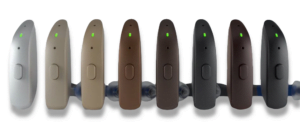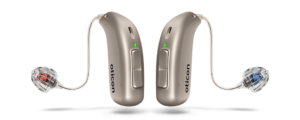Hearing aids have come a long way in recent years, with advanced technology that can significantly improve the quality of life for individuals with hearing loss. Yet, despite these advancements, there are still many misconceptions and myths surrounding hearing aids. In this blog post, we aim to set the record straight by debunking some of the most common hearing aid myths and presenting the facts.
Myth #1: Hearing Aids Are Only for the Elderly
Fact: It’s a common misconception that hearing aids are exclusively for older individuals. While age-related hearing loss, known as presbycusis, is prevalent among seniors, it’s important to recognise that hearing loss can affect people of all ages. In fact, hearing impairment knows no age boundaries and can strike anyone, from infants to young adults and beyond.
Hearing loss can be caused by various factors beyond the natural aging process. Some young adults and even children may experience hearing difficulties due to factors like genetics, exposure to loud noise, infections, or medical conditions.
Myth #2: Hearing Aids Are Bulky and Unattractive
Fact: Another common misconception about hearing aids is that they are bulky and unattractive, reminiscent of the large, conspicuous devices from years past. However, in the world of hearing healthcare, times have changed, and modern hearing aids are nothing like their predecessors.
In recent years, hearing aid technology has advanced significantly, and so has the design. Today’s hearing aids are sleek, discreet, and, in many cases, nearly invisible. Audiologists and hearing aid manufacturers have put a great deal of effort into making hearing aids more aesthetically appealing.
You can choose from a variety of hearing aid styles to suit your preferences and comfort. Options like completely-in-the-canal (CIC) and receiver-in-canal (RIC) models are small and sit discreetly in or behind the ear. A lot of hearing aid models are available in a range of colours, allowing you to match them to your skin tone or personal style.

Myth #3: Hearing Aids Restore Hearing to Normal
Fact: It’s important to address the misconception that hearing aids can completely restore your hearing to a “normal” state. While these remarkable devices can significantly improve your ability to hear and understand sounds and conversations, there are important nuances to consider.
The degree of improvement you experience with hearing aids depends on several factors, including the type and severity of your hearing loss, the quality of the hearing aids, and the expertise of your audiologist during the fitting process. Some individuals may achieve near-normal hearing experiences with their devices, while others may experience a partial restoration of their hearing capabilities.
Myth #4: You Only Need One Hearing Aid
Fact: It’s a common misconception that if you have hearing loss in one ear, you only need one hearing aid. While it’s true that some individuals may have hearing loss that primarily affects one ear, there are compelling reasons to consider binaural (two-ear) hearing aid solutions.
Binaural hearing aids offer numerous advantages, including better sound localisation, improved clarity in noisy environments, and a more balanced listening experience. Even if your hearing loss is more pronounced in one ear, wearing two hearing aids is often recommended to optimise your hearing and overall satisfaction. Consultation with a hearing care professional is essential to determine the most suitable solution based on your specific needs and hearing profile.

Myth #5: Hearing Aids Are Uncomfortable and Painful
Fact: Some people worry that wearing hearing aids will be uncomfortable or even painful. While it’s normal to need a short adjustment period to get used to the sensation of wearing hearing aids, discomfort and pain are not typical experiences.
Modern hearing aids are designed with comfort in mind, and audiologists work closely with patients to ensure a proper fit. Any discomfort can often be addressed through adjustments or customisations to maximise comfort and effectiveness.
Myth #6: Hearing Aids Are Too Expensive
Fact: While hearing aids can represent an investment in your hearing health, it’s essential to recognise that there are various options available to suit different budgets. It’s a common misconception that hearing aids are prohibitively expensive. Additionally, in some cases, there are financing opportunities available to help offset the cost.
Considering the long-term benefits to your quality of life, productivity, and overall well-being, many individuals find that the value of hearing aids far outweighs their initial cost. A consultation with a hearing care professional can provide you with a better understanding of the pricing options and potential financial assistance available to you.

Myth #7: I Don’t Need a Hearing Aid for Mild Hearing Loss
Fact: It’s a common misconception that only severe hearing loss warrants the use of hearing aids. In reality, even mild hearing loss can have a significant impact on your daily life and well-being. While individuals with mild hearing loss may still be able to hear some or most sounds, they often struggle with understanding speech, especially in noisy environments. This can lead to communication difficulties, social isolation, and reduced quality of life.
Addressing mild hearing loss with hearing aids can make a substantial difference. Hearing aids can enhance your ability to hear soft speech sounds, participate in conversations with ease, and enjoy various activities without strain. Additionally, early intervention with hearing aids can help prevent the progression of hearing loss and maintain your overall cognitive function.






